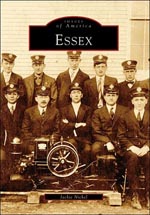Avenuenews.com
Well, just as the fall season of prime time TV kicks off, the new season of civic/improvement association meetings begins. Which means I, and many others like me, will be out two or three evenings a week, keeping abreast of the latest community developments and missing most of our favorite shows. But then, television is not important in the scheme of things when weighed against the impact of new housing, roads and businesses alongside old schools, old sewer and water lines and other old infrastructure.
So while younger folks have kids to put to bed and older folks don’t want to go out at night, my civic colleagues and I choose to attend educational and informative community meetings. Often, when only a handful of folks show up to share our concerns, we wonder why we do it. Are civic activists a dying breed? Sometimes it looks that way. Then just when we get discouraged, someone like Bud Yingling of Bird River Beach brings in his granddaughter and a new generation of activists seems assured.
Some people are turned off by the word activist, assuming, I presume, that it means obstructionists (or rabble rouser as we say in Essex, hon). Many times I have been described in the newspaper as “a local civic activist” and many times, I admit, I think about the perception vs. reality of the description. I’ve never picketed (well, maybe once during the [SB] 509 debacle) and I’ve never formally debated a subject – in fact, I avoided public speaking like the plague during high school and college.
But when the spirit moves you, and you just know you’re right and someone else is wrong – and the issue is so important that people or the land might be harmed if you don’t speak out…that’s when you become an activist. You find your voice and your passion and the strength to stand up for what you believe in. And you can no longer stand silently by.
It’s sort of like a Good Samaritan story. Would you (could you) pass by an injured person on the side of the road? Would you (could you) refuse to feed a starving animal? Would you (could you) stand by and watch a company pour poisonous chemicals into a stream? Would you (could you) speak out, scream if necessary, to get the attention of others, to gain the support you need to come to the aid of the person, the animal or the stream?
The final and most salient question: Would you (could you) take the criticism that surely will follow? Is your skin thick enough to endure the questioning of your motives and even personal attacks from those who disagree? If it’s not, that’s OK. You and your skin will surely toughen up with time and practice. Mine has.
Activism does not mean negativity. Many current projects, going back to the extension of MD Route 43, were pushed along and fine-tuned with the help of community leaders. The redevelopment of Riverdale, Tall Trees and Kingsley Park all reflect the imprint of civic groups. Sewer and water extensions likewise.
The world of civic activism needs new blood. There are so many issues and so little time. Middle River has been extremely dirty this year – have you noticed? After two good years, it has looked unhealthy all summer. The decaying windows of some of our sweltering elementary school classrooms have yet to be replaced. You can’t even open them for ventilation. So if you have no other cause, not other concern, why not crusade for clean water or better schools?
Whatever matters to you, please come out to your local civic association meeting. There’s a list of them in The Avenue’s Community Guide. If you can’t find one that fits your needs, visit our umbrella group, Essex-Middle River Civic Council on the first Wednesday of the month at 7:30 p.m. at Victory Villa Community Center, Martin Boulevard and Compass Road. For your own satisfaction and the well-being of future generations, become an activist.
Jackie Nickel
Avenuenews.com
Sept. 21, 2005



One Response to Civic activism can be a fulltime, fulfilling job